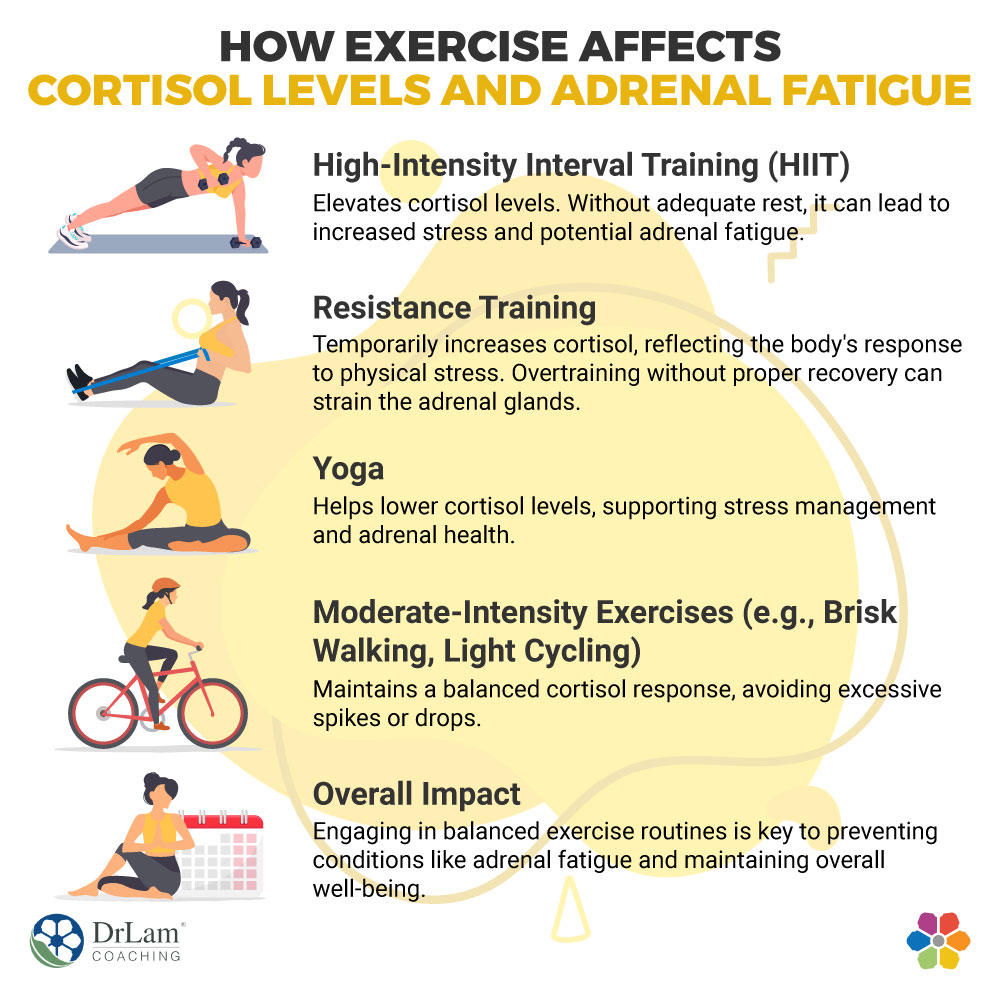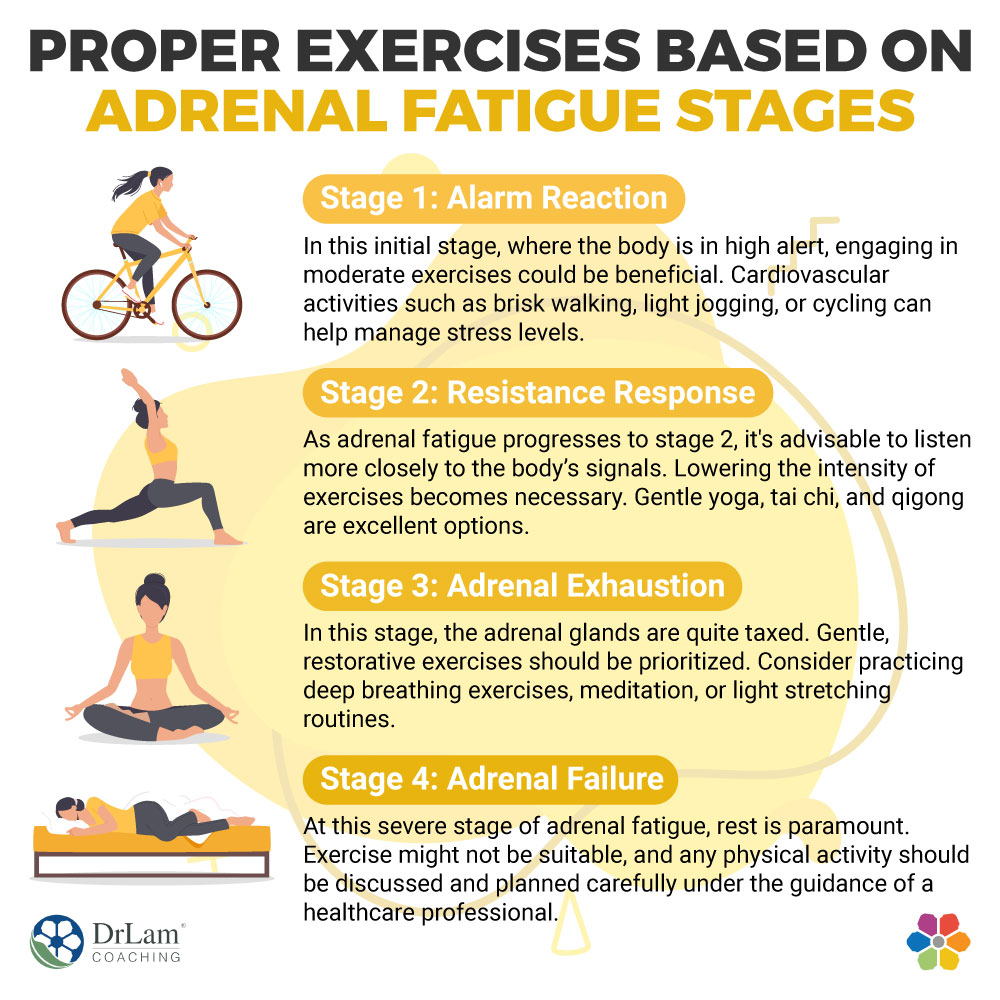 Adrenal fatigue can leave you shakey, exhausted, unable to sleep, and dealing with a slew of unusual symptoms. As such, just the thought of exercise may not appeal to you. Lacking energy can be the biggest demotivator when it comes to doing exercise with adrenal fatigue. Still, the experts encourage exercise when you struggle with the condition. However, you must do the appropriate kind of exercise that will not worsen existing symptoms, further deplete your energy levels, or lead to adrenal crashes. You can safely exercise with adrenal fatigue by doing physical activities that are best suited for your stage of the condition.
Adrenal fatigue can leave you shakey, exhausted, unable to sleep, and dealing with a slew of unusual symptoms. As such, just the thought of exercise may not appeal to you. Lacking energy can be the biggest demotivator when it comes to doing exercise with adrenal fatigue. Still, the experts encourage exercise when you struggle with the condition. However, you must do the appropriate kind of exercise that will not worsen existing symptoms, further deplete your energy levels, or lead to adrenal crashes. You can safely exercise with adrenal fatigue by doing physical activities that are best suited for your stage of the condition.
Adrenal Fatigue is the non-Addison’s form of adrenal dysfunction, a condition where the body’s stress response cannot keep up with life’s chronic stressors. This condition causes the development of a collection of symptoms that can seriously impact your quality of life. It’s sometimes referred to as a sub-clinical syndrome, a condition that stays “below the surface” of clinical detection.
Currently, Adrenal Fatigue Syndrome (AFS) is not recognized as a medical condition in the conventional medical field. However, many deal with inexplicable health issues that can be connected with the mechanisms of AFS. Therefore, its identification and addressing is one of our program’s main focuses.
AFS occurs when your adrenal glands cannot keep up with the body's demand for cortisol, the primary stress hormone. During short-term stress, the body releases cortisol, then stops when the stressor passes and the body can rest and repair. But when you experience chronic stress, your body becomes depleted of the resources needed to produce cortisol. Because cortisol shares precursors with several other key hormones, many of these hormones can dysregulate as well. Consequently, the NeuroEndoMetabolic (NEM) Stress Response system goes through an imbalance.
If you can safely exercise with adrenal fatigue, you may be able to reduce cortisol levels and positively impact some stressors. According to a study in the International Journal of Environmental Research and Public Health, regular lifestyle physical activity, structured endurance exercise, or both has potential stress-reducing effects. However, exercise also requires cortisol, and this can cause an adrenal crash when your body is already unable to supply enough of this hormone. So getting a "just right" level of exercise for your state of health is important.
Trying to exercise safely with adrenal fatigue can be a challenge. The fact is that some forms of exercise can increase the level of cortisol the body releases, which can worsen your condition. Adrenal fatigue typically progresses through stages where cortisol is high, trying to meet demand to reduce stressors, and then low, as the body becomes depleted and unable to meet demand.
Participating in intense or high-impact exercises may further increase the demand for cortisol release. Consequently, this may add more pressure on the body’s already overworked adrenals. As such, stress from physical exercise forces your body to release a higher amount of cortisol.
 This is why someone with adrenal fatigue who participates in strenuous exercise could potentially develop negative health issues depending on the stage of their condition. Patients can experience symptoms from intermittent fatigue to a constant low-energy state that may worsen with time. The last thing that you need is an adrenal crash.
This is why someone with adrenal fatigue who participates in strenuous exercise could potentially develop negative health issues depending on the stage of their condition. Patients can experience symptoms from intermittent fatigue to a constant low-energy state that may worsen with time. The last thing that you need is an adrenal crash.
The best approach is to add gentle exercises that you can gradually build on over time. More importantly, talk to your doctor before starting any exercise program, especially if you suffer from adrenal fatigue.

Exercise holds a potent influence over adrenal fatigue due to its direct correlation with cortisol levels—the body’s primary stress hormone. Engaging in exercise naturally triggers the release of cortisol, an essential response that helps manage and adapt to the physical stress. However, the impact of exercise on adrenal health substantially depends on its intensity and duration. Athletes or individuals who frequently engage in high-intensity or prolonged exercise sessions often experience sustained elevations in cortisol levels, a factor that can precipitate or exacerbate adrenal fatigue. The constant stress that rigorous exercise imparts on the body can overwhelm the adrenal glands, impairing their ability to adequately produce and balance essential hormones. Consequently, this may lead to the onset of symptoms associated with adrenal fatigue, such as extreme tiredness, body aches, and difficulty in managing stress. Thus, while exercise is a fundamental aspect of a healthy lifestyle, its role in adrenal fatigue underscores the significance of balance and moderation to ensure that physical activity nourishes rather than depletes adrenal health.
Exercise impacts cortisol levels in various ways, depending on the type and intensity of the physical activity. High-Intensity Interval Training (HIIT) tends to elevate cortisol concentrations. Engaging in such vigorous exercise routines without adequate rest may lead to heightened stress levels, contributing to adrenal fatigue over time. Resistance training also results in a temporary increase in cortisol levels, reflecting the body’s natural response to physical stress. Persistent heavy training without proper recovery could potentially strain the adrenal glands. Conversely, yoga appears to help lower cortisol levels, suggesting its supportive role in managing stress and enhancing adrenal well-being. Engaging in moderate-intensity exercises like brisk walking or light cycling typically maintains a balanced cortisol response, preventing excessive spikes or drops in cortisol levels. Such exercises can be beneficial in promoting a balanced lifestyle and preventing conditions like adrenal fatigue.
The goal is to safely exercise with adrenal fatigue to boost your aerobic capacity. This will not only strengthen your lungs but also increase oxygen uptake. Consequently, oxygenated blood is pumped to the muscles in your body and leads to improvements in your body’s cell function and health. Still, some exercises can be too much if you have adrenal fatigue.
In particular, you may need to avoid high-intensity resistance exercises with short rest periods. This form of physical exercise requires a higher cortisol output, and an increased adrenal response could be harmful to those with adrenal fatigue. For instance, a CrossFit type of exercise program could likely produce a higher cortisol output and cause adrenal stress. This could lead to further adrenal dysregulation.
 In the late stages of adrenal fatigue, exercising with care becomes crucial, ensuring that the body is not pushed past its maximum heart rate (MHR). Overexertion, especially beyond one's MHR, can exert undue stress on the adrenal glands, which are already compromised, possibly exacerbating the symptoms of adrenal fatigue. To calculate the maximum heart rate, subtract your age from 220. For instance, if you are 40 years old, your estimated MHR would be around 180 beats per minute (220-40). When managing late-stage adrenal fatigue, consider engaging in gentler, restorative physical activities like walking, yoga, or tai chi, and aim to maintain your heart rate well below the calculated MHR. This approach allows for physical activity's benefits without overburdening the adrenal glands, promoting a balanced pathway toward recovery and holistic well-being. Always consult with a healthcare professional before starting any new exercise regimen, particularly when dealing with health conditions like adrenal fatigue.
In the late stages of adrenal fatigue, exercising with care becomes crucial, ensuring that the body is not pushed past its maximum heart rate (MHR). Overexertion, especially beyond one's MHR, can exert undue stress on the adrenal glands, which are already compromised, possibly exacerbating the symptoms of adrenal fatigue. To calculate the maximum heart rate, subtract your age from 220. For instance, if you are 40 years old, your estimated MHR would be around 180 beats per minute (220-40). When managing late-stage adrenal fatigue, consider engaging in gentler, restorative physical activities like walking, yoga, or tai chi, and aim to maintain your heart rate well below the calculated MHR. This approach allows for physical activity's benefits without overburdening the adrenal glands, promoting a balanced pathway toward recovery and holistic well-being. Always consult with a healthcare professional before starting any new exercise regimen, particularly when dealing with health conditions like adrenal fatigue.
When starting an exercise program, you should be cautious, since any form of exercise has the potential to worsen your adrenal fatigue symptoms. It's important to remember that the best form of exercise for you may depend on the stage of adrenal fatigue that you are experiencing. If you are struggling with very advanced adrenal fatigue, then it’s better to not exercise to avoid adrenal crashes. However, when you are recovering, yoga, pilates, light walking, or stretching, are all good exercise options.
In general, during your recovery from adrenal fatigue, low-impact exercises are your best option. For many people, the best exercises for adrenal fatigue might include:
One of the benefits of these forms of exercise is that they support fat burning, working for you, instead of against you.
If you are stronger, you can move on to doing more intense exercises as your adrenal fatigue recovery progresses. Circuit training or resistance training are good options for people with adrenal fatigue. Play-like activities with others, like hiking, intramural sports, or paddleboarding can also allow you to safely exercise with adrenal fatigue.

Adapting exercise routines based on the various stages of Adrenal Fatigue Syndrome (AFS) is essential for effective and supportive recovery. Here’s a guide on how to tailor exercises to each stage of AFS:
In this initial stage, where the body is in high alert, engaging in moderate exercises could be beneficial. Cardiovascular activities such as brisk walking, light jogging, or cycling can help manage stress levels. However, it’s crucial not to overexert, ensuring exercise remains a stress-relief activity rather than a stress inducer.
As adrenal fatigue progresses to stage 2, it's advisable to listen more closely to the body’s signals. Lowering the intensity of exercises becomes necessary. Gentle yoga, tai chi, and qigong are excellent options. These practices not only enhance flexibility and strength but also promote relaxation and stress relief, helping the adrenal glands recover.
In this stage, the adrenal glands are quite taxed. Gentle, restorative exercises should be prioritized. Consider practicing deep breathing exercises, meditation, or light stretching routines. These types of exercises help to calm the mind and body, encouraging a restful state which is supportive of adrenal recovery.
At this severe stage of adrenal fatigue, rest is paramount. Exercise might not be suitable, and any physical activity should be discussed and planned carefully under the guidance of a healthcare professional. Gentle breathing exercises and meditation might be the only activities advisable, primarily focusing on rest and recovery.
Tailoring exercises to the specific stages of AFS ensures that physical activity supports recovery rather than exacerbating adrenal fatigue. It's crucial always to listen to the body’s signals and avoid overexertion, ensuring that exercise contributes positively to the healing process.
 Remember, to safely exercise with adrenal fatigue, first get approval from your physician. You want to ensure that the physical activities that you choose to engage in aren’t overly taxing on the body.
Remember, to safely exercise with adrenal fatigue, first get approval from your physician. You want to ensure that the physical activities that you choose to engage in aren’t overly taxing on the body.
In terms of exercise intensity, you want to keep your heart rate down (under 120 beats per minute), get your blood flowing, and at the same time break a sweat. You want to avoid adrenal crashes and worsening symptoms.
While you don’t want to overdo exercise, aim to exercise two to three times a week to gradually boost energy levels. You may want to start with 15 to 20 minutes, depending on how strong you feel. Also, do low-intensity exercises that require less exertion or strain.
Exercise may help lower cortisol reactivity over time, but don't overdo it. According to an article in the Journal of Clinical Medicine, physical activity is linked with a favorable cortisol stress reactivity in healthy people. However, people with adrenal fatigue have to be mindful of the types of physical activities they undertake. Some people may need to stay away from intense exercises and opt for resistance training until they are stronger.
Remember to reduce your exercise if you experience increased tiredness. More than anything else, listen to your body and respond appropriately.
Adrenal fatigue can be caused by several potential factors. However, chronic stress and an ongoing need for cortisol, the stress hormone, is often the primary culprit. Because exercise can increase cortisol levels when your body is already low, you need to be careful when exercising with adrenal fatigue. It's best to start with gentle, low-intensity exercises a few times a week, like walking, yoga, swimming, biking, or resistance training. With your doctor's approval, you can move on to more intense exercises as your recovery progresses. Above all, listen to your body.
Dr. Lam's Nutritional Adrenal Fatigue Recovery Program offers a comprehensive approach to adrenal health. With a meticulous blend of suitable exercises, it aims to foster recovery without overburdening the adrenal glands. The program emphasizes the importance of customizing exercise routines according to the different stages of adrenal fatigue, ensuring that each individual receives a regimen that aligns with their unique recovery needs.
Through a synergy of targeted exercises, strategic supplementation, and a wealth of educational resources, participants are navigated through a journey that prioritizes their holistic wellbeing and paves the way toward recovery and resilience.
To learn more and embark on your journey towards renewed vitality and health, contact us directly at +1 (626) 699-8184 or click here to schedule a free initial call. Let us support you in reclaiming your well-being and resilience.
Franklin, Barry A, et al. “Chronic Stress, Exercise and Cardiovascular Disease: Placing the Benefits and Risks of Physical Activity into Perspective.” International Journal of Environmental Research and Public Health. vol. 18,18 9922. 21 Sep. 2021, doi:10.3390/ijerph18189922. https://www.researchgate.net/publication/354738584_Chronic_Stress_Exercise_and_Cardiovascular_Disease_Placing_the_Benefits_and_Risks_of_Physical_Activity_into_Perspective
Gerber, Markus, et al. “Effects of Aerobic Exercise on Cortisol Stress Reactivity in Response to the Trier Social Stress Test in Inpatients with Major Depressive Disorders: A Randomized Controlled Trial.” Journal of Clinical Medicine. vol. 9,5 1419. 11 May. 2020, doi:10.3390/jcm9051419. https://pubmed.ncbi.nlm.nih.gov/32403243/
Martínez-Díaz, Inmaculada C., and Luis Carrasco. "Neurophysiological Stress Response and Mood Changes Induced by High-Intensity Interval Training: A Pilot Study." International Journal of Environmental Research and Public Health, vol. 18, no. 14, 2021, https://doi.org/10.3390/ijerph18147320. https://www.mdpi.com/1660-4601/18/14/7320
It is possible to safely exercise with adrenal fatigue with the right exercise regimen and protocols in place. Talk to your doctor first for guidance before starting. Stay away from exercises that requires significant exertion, like HITT, and avoid exercises that are taxing. Aim for vey gentle exercise to start with, like yoga, walking, and swimming.
